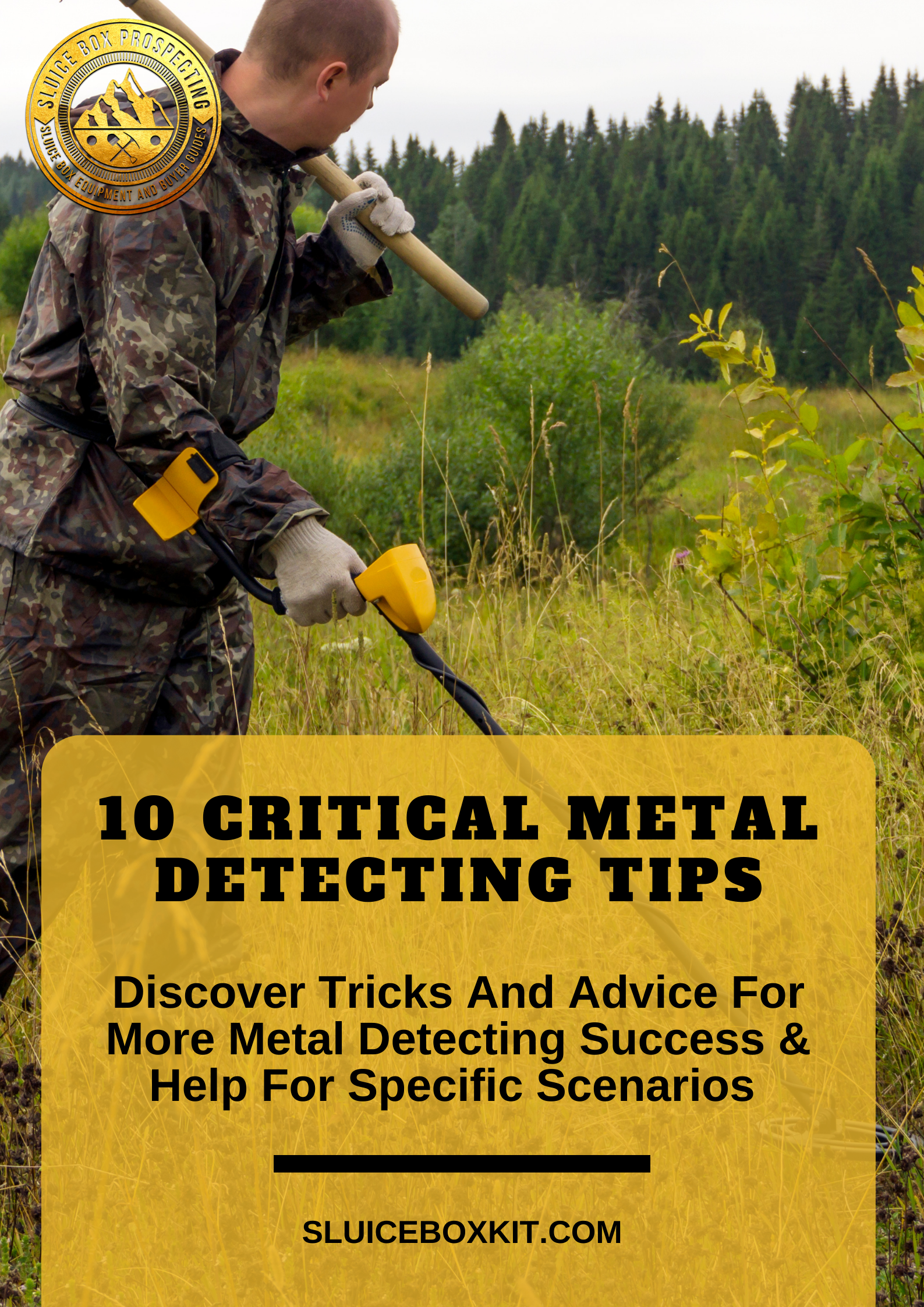Metal detecting can be a fun and exciting hobby, but it can also be frustrating if you’re not doing it correctly. This blog post will provide some metal detecting tips and tricks to help you have the best success while metal detecting.
We’ll also offer metal detector recommendations and how to find the right one for your needs. So whether you’re a beginner or an experienced metal detectorist, read on for the best tips and advice!
Basic Metal Detecting Tips Before Starting
Table of Contents
First, you need to have a general idea of what types of treasures or lost items you want to find. Metal detectors can find all sorts of metals, from iron and aluminum to gold and silver. If you’re looking for a specific type of metal, be sure to research what kind of metal detector is best for finding that type of metal.
Second, it’s essential to know where to look for metals. The beach is a great place to start, but you can also try your backyard or a local park. Just make sure you get permission before metal detecting on someone else’s property!
Third, keep an eye out for trash and other objects that might interfere with your metal detector’s signal. This interference can be frustrating, but it’s important to be patient and keep looking. You never know what you might find!
Finally, don’t forget to have fun! Be sure to take your time, be observant, and learn about the different features of your detector! Metal detecting can be a great way to relax and enjoy the outdoors.
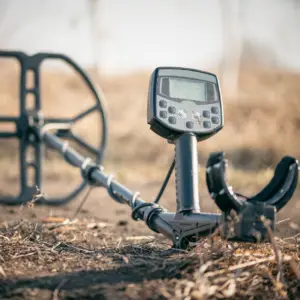
10 Metal Detecting Tips For Beginners
When looking for a metal detector, there are a few basic features to keep in mind. First, you’ll want to consider the weight and size of the detector. If you plan on doing a lot of walking, you’ll want something lightweight and easy to carry.
Second, think about the type of terrain you’ll use the detector. If you’re primarily going to be using it on the beach, use the best detector for those conditions.
Third, consider what kind of budget you have. Metal detectors can range in price from around $50 to over $1000. It’s important to find one within your budget and meets your needs.
Review Which Detection Modes Your Metal Detector Has
One of the most important things to consider when buying a metal detector is what kind of detection mode it has. For example, the Minelab Equinox 800 has four main modes: Park, Field, Beach, and Gold.
All-metal, or in other words, “detect everything” mode is most common. However, additional modes will allow you to hunt for specific types of metal like gold or other relics.
Learn About The Discrimination Features Of Your Metal Detector
Discrimination settings filter out certain types of metal, so you’re only left with the metals you want to find.
For example, if you’re only interested in finding gold, you can set the discrimination to filter out all other metals. This setting can be helpful if you’re in an area with a lot of trash or other objects that might interfere with your detector’s signal.
Familiarize Yourself With The Sensitivity Settings Of Your Detector
The sensitivity of a metal detector is how attuned the machine is to metals. The higher the sensitivity, the more likely it is to detect metals.
However, if the sensitivity is too high, the machine may give false readings or become overloaded with information. It’s important to find a balance that works for you and your hunting environment.
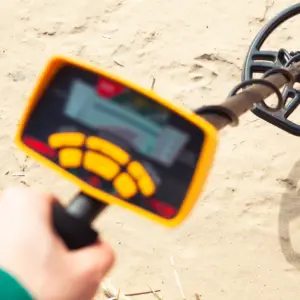
Utilize Your Metal Detector’s Ground Balancing Features
Ground balancing is calibrating your machine to the ground you’re currently standing on. This feature helps filter out false signals coming from minerals in the dirt.
Most modern detectors have an automatic ground balance feature, but some older models will require you to do it manually.
Understand The Operating Frequencies Of Metal Detectors
The operating frequency of a metal detector is the rate at which it sends out electromagnetic waves. The higher the frequency, the more sensitive the machine is to small pieces of metal.
However, higher frequencies can also be more affected by power lines or other electronic device interferences. Most detectors operate between two and four kHz, but some newer models can go up to 20 kHz.
The best metal detecting frequency is between 5 kHz to 15 kHz. This range is where most general-purpose metal detectors are tuned and the easiest to manage for beginners. – metaldetectingtips.com
VLF, or Very Low Frequency, is the most common frequency used in metal detectors. It operates between three and 30 kHz.
PI, or Pulse Induction, is a newer technology that uses short pulses of high-frequency waves to penetrate the ground. It’s primarily used in detectors in saltwater or highly mineralized soil.
Consider The Coil Size Of Your Metal Detector
The coil is the part of the detector that sends out electromagnetic waves and receives signals from metals.
A coil shape can be a crucial factor in your metal detecting pursuit. Circular coils are the most practical choice because they offer stability and better performance, while different shapes may be necessary for suitability to specific environmental requirements. – themetaldetectingguy.com
There are two main types of coils: concentric and DD. Concentric coils have one round wire wrapped around another, while DD (Double-D) coils have two parallel wires.
Coils come in different sizes, but six, eight, and eleven inches are most common. However, larger sizes are available, such as 12″, 15″, or 17″ size coils. The size of the coil will affect how deep it can detect metals and how sensitive it is to smaller pieces.
Take An Online Course From Professionals To Advance Your Learning
Whether you are a beginner or consider yourself an expert, learning from the top metal detectorists can help improve your hunts. Check out The Top 3 Metal Detecting Courses.
10 Metal Detecting Tips While You Are Hunting
There are a few basic tips to keep in mind when using your metal detector. First, always start with the sensitivity on the lowest setting. Doing so will help prevent false readings.
Second, keep the coil as close to the ground as possible. This technique will help you get the most accurate readings. Below are seven more helpful metal detecting tips to help you experience success and locate more finds.
Use A Pinpointer To Help Find Your Metal Detections
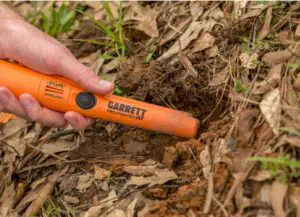
A pinpointer is a small handheld device that helps you locate metal objects once you’ve already found them with your detector. They’re not required, but they can be a helpful tool, especially if you’re new to metal detecting. Check out our list of the three best metal detecting pinpointers.
Start With An Easy-To-Use Machine In A Good Location
If you’re a beginner, it’s important to find an easy-to-use machine that suits your needs. If you’re helping your child, review the best metal detectors for kids.
Focus On Learning How Your Metal Detecting Machine Works
When you first start using your metal detector, it’s essential to take your time and get used to the machine. Start by turning on the discrimination and working in an area with low trash levels. Doing so will help you feel how your machine works and what kind of signals it gives off.
Slowly Swing Side-To-Side In A Slow, Even Motion
Carefully swing the metal detector side-to-side in a slow, even motion to help ensure that you don’t miss anything.
Research And Hunt Locations With Low Traffic From Other Detectorists
If you want to be successful at metal detecting, it’s important to find an area that hasn’t been heavily hunted. Talk to other detectors in your area and see where they’ve had the most success. Research online and look for areas that have been recently plowed or developed.
Go Metal Detecting After A Heavy Rain
Another tip is to go out after a storm. After the rain is a great time to metal detect because the rain will have moved things around, and you’re more likely to find something interesting.
Stay Safe And Comfortable With The Appropriate Gear
Finally, be sure you have a nice pair of metal detector boots and don’t forget to bring along a shovel and some gloves! Metal detecting can be a dirty hobby, but it’s worth it when you find that rare coin or piece of jewelry.
If you want to check out more metal detecting tips and tricks, check out the following posts for even more insight:
- Jase Robertson Metal Detecting Tips and Tricks
- 8 Best Metal Detecting For Kids Tips
- 9 Gold Detecting Tips For Hunting Success
Metal Detecting Tips For Coins
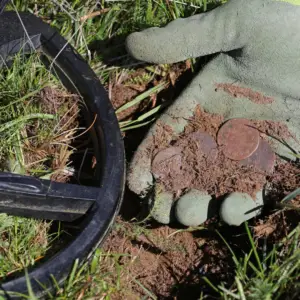
Coin shooting is a term used to describe the hobby of metal detecting for coins. You can do this in many different places, such as parks, beaches, and even your backyard.
When coin shooting, there are several things to know, such as where to look and what type of detector to use.
Look for areas that have been recently plowed or developed. New dirt will have been turned over, and there is a greater chance of finding old coins.
Another good place to look is in parks or on beaches. People tend to lose things in these places, so there is a higher likelihood of finding coins.
Research for old homesites, schools, mills, churches, and other structures that existed pre-1950 and even earlier, like the 1800s. There are a few things to keep in mind when hunting old homesites for lost coins. Learn as much about the history of the site and what type of objects may be buried there.
Second, using a metal detector specifically designed to find coins is important. These detectors are more sensitive and will help you find smaller objects.
- Nokta Makro Simplex (Good)
- Garrett AT Pro (Better)
- Minelab CTX 3030 (Best)
Third, it is important to dig carefully when you find a target to help ensure that you do not damage any potential treasures.
Also, using a quality pinpointer is ultra-handy when locating coins after digging a target. A pinpointer can save you lots of time and help you avoid missing coins while sifting through the dirt.
Finally, it is always good to consult with an “old-timer, local historian, or an individual familiar with the history of the location you desire to hunt.
Tips For Metal Detecting Old Home Sites
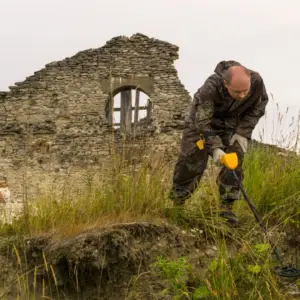
Look in areas once used for daily activities, such as the kitchen, bathroom, and laundry room. Also, check out places where people gather, such as the living room and porches.
You should also scan the yard, particularly around trees, as coins are often lost in these areas. Take time to hunt old fence lines and clotheslines too.
Old driveways, two-track roads, and other pathways near the property are ideal places to search while metal detecting. These are also great places to look, as you can often find coins near these paths.
Finally, don’t forget to check out any outbuildings on the property, such as barns, sheds, or garages. These are often overlooked but can be great places to find lost coins.
When metal detecting an old homesite, it is vital to use a specifically designed detector for finding coins. These detectors are more sensitive and will help you find smaller objects.
For this purpose, some of the best detectors are the Garrett AT Pro and the Minelab CTX 3030. These detectors are highly sensitive and help you locate small objects that other detectors may miss.
Beach Metal Detecting Tips
Beach metal detecting can be a great way to find lost jewelry, coins, and other treasures. However, there are a few things to keep in mind if you want to succeed.
The first thing to consider is the type of detector you use. A pulse induction metal detector is the best choice for beach hunting because it can discriminate between metals and ignore saltwater interference.
Second, use a broad and steady swing, methodically covering ground to help you find as much as possible.
Third, it is good to search near lifeguard towers or other areas where people tend to congregate. These areas tend to have more foot traffic, and there is a greater chance of finding lost items.
Finally, dig using a quality sand scoop to locate the target to help ensure that you do not damage any potential treasures.
Tips For Metal Detecting In Woods
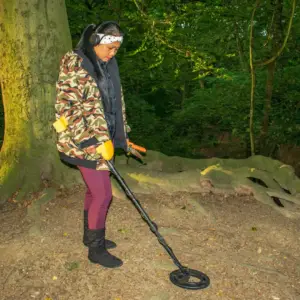
Before detecting metal in woods you do not own, check local laws and seek necessary permission before hunting. You will need to research the laws in your area before you begin metal detecting in the woods.
Avoid private property without permission and areas posted as off-limits. It is also important to be aware of your surroundings and not damage any plant life or disturb animal habitats.
A pulse induction metal detector is the best choice for wooded areas because it can discriminate between metals and ignore leaves and other interference.
- Minelab Equinox 800 (Multi-frequency)
- Garrett AT PRO
It is good to search near trails or other areas where people congregate. These areas tend to have more foot traffic, and there is a greater chance of finding lost items.
Other types of locations to identify in the woods to help ensure more success while metal detecting. If you are metal detecting in the woods, look for:
- Abandoned structures
- Old foundations
- Wells
- Cross-paths
- Campsites
- Very Old Trees
- Logging Roads & Two Tracks
Some other metal detecting tips to keep in mind when in the woods include:
- Wear appropriate clothing and footwear.
- Bring a compass and map to help you stay oriented.
- Pack snacks and water in case you get lost or stranded.
- Be prepared for inclement weather.
- Carry a first-aid kit in case of injury.
- Tell someone where you are going and when you will be back.
- Bring a flashlight for hiking in low-light conditions or after dark.
You will have a successful experience in the woods by following these metal detecting tips! These are just a few pro tips to follow but remember that every situation is different, so always use your best judgment.
Metal Detecting Tips Summary
There you have it! These metal detecting tips will help you get started and improve your chances of success.
If you are an experienced hunter, use these tips to take your skills to the next level. And always remember to have fun! Metal detecting is an excellent hobby for people of all ages.
So what are you waiting for? Get out there and start hunting for treasures! You never know what you might find. Thanks for reading, and happy metal detecting!

